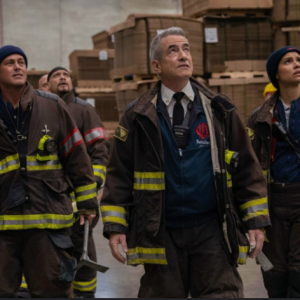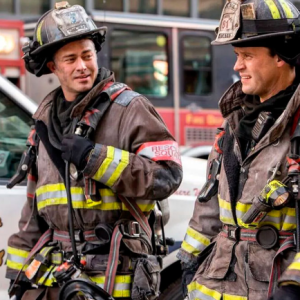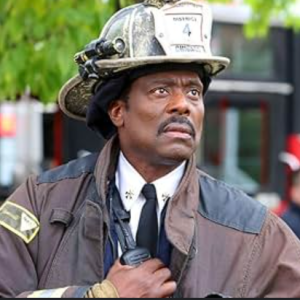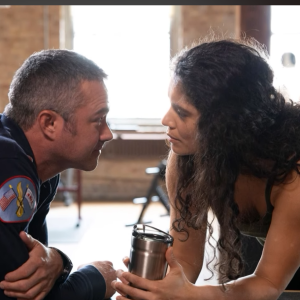DuShon Monique Brown, the radiant actress best known for her role as Connie in Chicago Fire, left behind a legacy of warmth, strength, and quiet power that continues to resonate throughout Firehouse 51 years after her passing. When news broke in March 2018 that she had died suddenly at the age of just 49, the shock was felt not only by the show’s millions of viewers but also by her colleagues on set, who had come to know her not merely as a co-star, but as a friend and a family member. To audiences, she was the steady presence in Chief Boden’s office, the firm yet caring voice of order who kept the firehouse grounded; to those who knew her personally, she was a woman of immense generosity, intelligence, and humor. Her absence created a silence that could not be filled, but her spirit lingers in every tribute, every memory, and every quiet moment when fans recall Connie’s unassuming yet indispensable presence in the halls of Firehouse 51.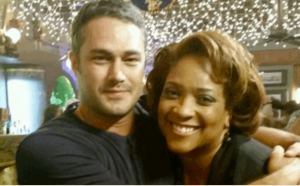
Long before television fame found her, DuShon was already a woman of immense impact, guiding and mentoring countless lives. Born and raised on the South Side of Chicago, she pursued education and counseling with the same dedication that later defined her acting career. As a licensed counselor and school administrator, she spent years helping students navigate the challenges of adolescence, always offering compassion and structure in equal measure. This real-life devotion to others translated seamlessly into her on-screen work, where she projected a natural authority and warmth that could never be faked. After transitioning into acting, she took on small roles that steadily built her reputation: appearances on Shameless, Empire, Boss, and especially her recurring role in Prison Break all showcased her ability to imbue even minor parts with authenticity. But it was Chicago Fire that gave her the platform to fully display her presence, where her casting as Connie—Chief Boden’s assistant—quickly evolved from background role to fan-favorite character, thanks to the grace, humor, and subtle power she brought to every scene.
Her sudden passing on March 23, 2018, after she had sought treatment for chest pains earlier in the week, sent waves of grief through the Chicago Fire family. The cast and crew, stunned by the loss, poured out tributes that revealed the depth of her impact behind the camera. Showrunner Derek Haas described her as “a beautiful soul” and lamented that her absence left a hole in their world. “She brought warmth and grace to our set every day,” Haas shared, emphasizing that she was not simply part of the show—she was part of their family. Co-stars echoed these sentiments, remembering her for her laughter that filled rooms, her tireless professionalism, and her unwavering kindness that made every long day on set a little easier. Fans, too, joined in the mourning, flooding social media with messages of thanks and grief, recognizing that though she wasn’t one of the firefighters running into burning buildings, Connie was the backbone of Firehouse 51, a reminder that strength often takes quieter forms.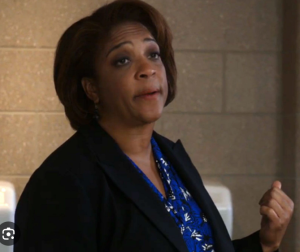
The decision about how to handle her character’s absence was a delicate one, but the producers chose to honor DuShon’s memory rather than attempt to replace her. In Season 7, Chief Boden explained that Connie had left the firehouse to pursue a graduate program in counseling, a narrative choice that resonated deeply with fans who knew of DuShon’s real-life background in education and mental health. It was a subtle yet profoundly respectful tribute, aligning the character’s exit with the actress’s true calling outside of television. In doing so, the show ensured that Connie’s presence would never be erased or diminished, but rather allowed her to live on in the hearts of the characters and the audience alike. It was a rare moment in network television where fiction and reality intertwined gracefully, giving both fans and colleagues the chance to say goodbye in a way that honored the life behind the role.
Even beyond her work on Chicago Fire, DuShon Monique Brown left an indelible mark. She was a mother, a mentor, a friend, and an advocate for mental health and community engagement. Those who knew her speak of her generosity, her humility, and her refusal to forget where she came from. Within the One Chicago universe, her absence is still felt, but so too is her enduring legacy. Connie, the character she so effortlessly brought to life, remains a symbol of quiet resilience and dignity, qualities that reflected DuShon herself. In a television landscape often dominated by flash and spectacle, she stood out by embodying something rare: authenticity. She didn’t demand attention—she earned it with her presence, her spirit, and her grace. Though her flame was extinguished far too soon, its glow continues to light the memories of fans and colleagues alike, ensuring that DuShon Monique Brown will always be a cherished member of Firehouse 51.

